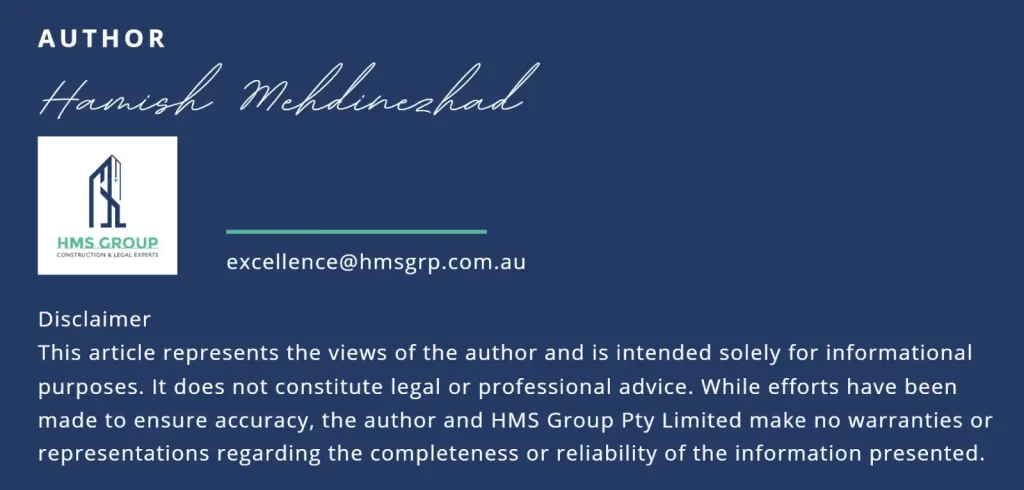On 5 May 2025, the New South Wales Court of Appeal handed down its procedural judgment in Builtcom Constructions Pty Ltd v VSD Investments Pty Ltd as trustee for The VSD Investments Trust [2025] NSWCA 93, dissolving a temporary stay and directing the release of over $8.7 million as adjudicated amount to the contractor.
The Court declined to restrain payment of the uncontested portion of an adjudication determination, reinforcing the core principle of the Building and Construction Industry Security of Payment Act 1999 (NSW) (SOPA), prompt interim payment flows to contractors, even where part of a determination is under review.
Although the underlying jurisdictional issues remain reserved for a later hearing, the Court’s interlocutory ruling offers clear procedural guidance and a pointed reminder that uncertainty alone will not dispense with SOPA’s risk allocation framework.
Full judgment: Builtcom Constructions Pty Ltd v VSD Investments Pty Ltd as trustee for The VSD Investments Trust [2025] NSWCA 93
Background
VSD Investments Pty Ltd, as principal, engaged Builtcom Constructions Pty Ltd under a construction contract for works in Burwood, NSW. On 22 November 2024, Builtcom served a payment claim under SOPA for approximately $30.6 million, covering work performed between 1 October and 22 November 2024. VSD issued a payment schedule. The matter proceeded to adjudication.
On 3 February 2025, the adjudicator determined that VSD was liable to pay Builtcom $8.5 million. However, he declined to value twelve of Builtcom’s claim items, applying what he understood to be the principle in Cardno — namely, that the supporting materials for those items were not included in, referred to, or otherwise incorporated by the payment claim, and therefore fell outside the scope of permissible consideration under s 22(2)(c) of the Building and Construction Industry Security of Payment Act 1999 (NSW). Whether that refusal constitutes a jurisdictional error remains unresolved and is the subject of a pending appeal.
Builtcom subsequently commenced judicial review proceedings, alleging that the adjudicator’s refusal to assess the twelve items constituted a jurisdictional error. VSD also brought its challenge, contending that the entirety of the $8.5 million determination was flawed. On 11 April 2025, the Supreme Court dismissed both parties’ claims. Neither party appealed the dismissal of VSD’s challenge to the $8.5 million award.
Following that dismissal, the Court ordered the release of $8.7 million (including interest) held in Court to Builtcom. VSD sought a stay of that order, arguing that if the pending appeal succeeded on the jurisdictional error question, it might be entitled to restitution of some or all of the funds.
The Court of Appeal was asked to determine whether such a stay should be granted pending the full hearing of Builtcom’s appeal.
The Issue on Appeal
The Court’s focus was strictly procedural: should the contractor be paid now, or should the funds remain frozen until the jurisdictional error appeal is resolved?
VSD argued that if the Court ultimately finds a jurisdictional error, it may be entitled to a full or partial reassessment of the adjudication, and that releasing the money now would create restitution risk if Builtcom later proves unable to repay.
Builtcom argued that:
- The $8.5 million was not under appeal and should be paid;
- SOPA requires prompt payment absent a valid challenge; and
- Section 32a permits partial severance, meaning only the contested portion could be set aside.
Section 32a and Partial Remitter
Section 32a of SOPA allows the Supreme Court to set aside “the whole or any part of” an adjudication determination if a jurisdictional error is established. The section was introduced to clarify the Court’s powers in cases involving partial invalidity, without requiring the entire determination to fall.
Although the jurisdictional error issue was not determined, the Court of Appeal considered arguments about the scope of s 32a, acknowledging that its construction may arise for resolution at the upcoming appeal, noting that:
“There is considerable force in Mr Hume’s submission about the effect of s 32a… While it would, at first blush, seem curious that VSD could revisit items that formed part of the (presently unchallenged) figure… I cannot rule out that consequence at this stage.”
This passage opens the possibility of future recovery, but affirms that uncertainty alone does not displace SOPA’s statutory risk allocation.
Decision
Adamson JA refused the stay and ordered immediate payment from Builtcom. Key findings included:
- The $8.5M Determination Stands
VSD had not appealed the dismissal of its judicial review application, and the adjudicated amount was not subject to ongoing challenge. As a result, the principal had no legal basis to prevent payment.
- Stay Refused – Risk Allocation Favours Contractor
The Court confirmed that SOPA places the interim risk of insolvency or repayment difficulties on the principal. The contractor’s right to receive payment must be preserved without a successful challenge.
The Court cited the reasoning in A-Civil Aust Pty Ltd v Ceerose Pty Ltd [2023] NSWCA 144, emphasising that interlocutory relief must not undermine SOPA’s twin objectives:
- Maintaining cash flow to contractors; and
- Allocating the risk of interim enforcement to principals.
Strategic Takeaways
This decision reinforces critical strategic principles for SOPA participants:
- Do Not Leave Determinations Partially Unchallenged: A party wishing to preserve restitution rights must formally challenge all relevant aspects of a determination. Partial inaction may foreclose future recovery.
- Jurisdictional Error Must Be Specific and Defensible: A general disagreement with valuation will not suffice. Parties must demonstrate that the adjudicator refused to perform a statutory function, as alleged by Builtcom regarding the twelve excluded claims.
- SOPA’s Risk Allocation and Payment Policy Remains Dominant: Even in unresolved legal arguments, the courts will maintain SOPA’s cash flow imperative. Payment delays will not be tolerated where adjudicated amounts remain uncontested.
- Section 32a May Permit Surgical Correction: Although not decided here, the Court’s openness to partial severance signals a path forward for parties seeking to preserve valid portions of a determination while challenging others.
Looking Ahead: The 23 May Appeal
The substantive jurisdictional issue remains unresolved, whether the adjudicator’s refusal to value twelve claims due to non-compliance with Cardno principles amounts to jurisdictional error.
That question is scheduled for hearing on 23 May 2025, and its outcome may provide authoritative guidance on:
- The boundaries of the Cardno test;
- The meaning of a “refusal to exercise jurisdiction” under SOPA; and
- The permissible scope of partial remittal under section 32a.
Conclusion
The Court of Appeal’s decision in Builtcom v VSD [2025] NSWCA 93 reinforces several procedural principles that flow directly from SOPA’s risk and payment framework.
First, where a portion of an adjudication determination is not the subject of an active challenge, as was the case with the $8.5 million awarded to Builtcom, the contractor is entitled to receive payment without further delay. VSD’s failure to appeal that portion of the determination removed any basis for withholding the funds.
Second, the Court declined to continue the stay, reaffirming that SOPA places the risk of restitution on the principal, not the contractor. The Court confirmed that where an adjudication determination remains standing and unchallenged, general concerns about the contractor’s capacity to repay, whether due to potential insolvency or otherwise, do not justify withholding payment under the statutory scheme.
Third, the Court’s reasons emphasised that the Act’s policy of preserving cash flow in the construction industry must guide the exercise of discretion in interlocutory matters. Procedural uncertainty cannot justify undermining that policy where no legal challenge remains.
Finally, while the court did not decide whether the adjudicator committed a jurisdictional error by refusing to value twelve of Builtcom’s claims, it confirmed that such matters will be addressed in the upcoming appeal hearing. Whether section 32a SOPA can be used to set aside part of the determination remains open, but the possibility of partial severance was expressly acknowledged.
In the meantime, this judgment stands as a clear procedural directive. Where no legal challenge is on foot, adjudicated sums must be paid promptly in keeping with the interim payment regime mandated by SOPA.
Authored by: Hamish Mehdinezhad | HMS Group Pty Limited | Principal
Grade 3 Arbitrator | Accredited Expert Determiner | Registered Adjudicator (QLD, WA & NT) | Registered Quantity Surveyor





